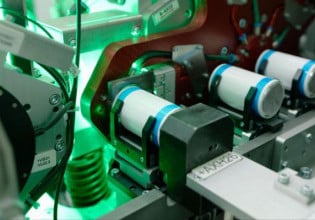Chemnitz University and Continental Developing Advanced Fuel Cell Systems
Technology company Continental AG is expanding its fuel cell technology sector. In strategic cooperation with the Chemnitz University of Technology Professorship of Advanced Powertrains (ALF), the newly established Fuel Cell Laboratory for Fuel Cell Technology was recently dedicated. With the installation of a large hydrogen tank (H2 Tank) in February 2019 at a laboratory belonging to the Professorship ALF, a central requirement for the expansion to more extensive measuring capabilities was put into place.
The Professorship ALF, headed by Prof. Dr. Thomas von Unwerth, has an excellent reputation in the field of research and development of fuel cells, due in large part to Unwerth‘s expertise. By working together with Continental AG as the largest industrial partner in the „HZwo – Antrieb für Sacvhsen“ Cluster of Innovation, the new Fuel Cell Materials Laboratory on the Chemnitz University of Technology campus is now one of the most modern H2 laboratories in Germany.
“It is clear that Chemnitz University of Technology takes on critical, future-oriented questions dealing with the economy and society as a whole. Undoubtedly, this includes the question of an economically and ecologically sensible alternative to the internal combustion engine. The fact that Chemnitz University of Technology is a leader in the field of hydrogen fuel cell technology is quite evident, as shown by the commissioning of this test bench, something unparalleled in the university sector throughout Europe,” explained Prof. Dr. Gerd Strohmeier, President of Chemnitz University of Technology.
“Hydrogen-based fuel cells have the potential to become an important part of the future of mobility. Therefore, we are intensifying our research and development efforts in this field,“ says Stephan Rebhan, Head of Technology and Innovation at Continental AG‘s Powertrain Division. “With Chemnitz University of Technology, we have gained an outstanding partner for the testing of materials, components and entire fuel cell systems. This continues a long series of successful collaborations with technical universities, and we are proud of this long tradition at Continental,” Rebhan continued.
High-performance testing with unparalleled characteristics
“The special technical equipment at the laboratory is unparalleled in the European university landscape,” said Prof. Dr. Thomas von Unwerth. “The heart of the new system is a high-performance test bench that accommodates permanent testing of powertrain performance up to 150 kilowatts. In the future, the test bench can also be converted up to 300kW. This lays the foundation for the development of next-generation fuel cells and fuel cell systems at Chemnitz University of Technology.“ Geared towards a networking-based outlook, third-party companies can also use the laboratory.
Electric drivetrains with fuel cells are expected to be an important option, especially for larger vehicles and long-range commercial vehicles. In order to test the performance of the fuel cell under different conditions, the new test bench is able to simulate changing environmental conditions and workloads, something that is essential for assessing the performance of a hydrogen fuel cell.
The tests are carried out at different temperatures, pressure conditions and humidity, and additionally under simulation of different load requirements, such as weight or mountainous terrain. Initial measurement tasks having to do with research projects involving innovative materials for fuel cells are already underway, and are creating the basis for mass production of particularly efficient and economical components and elements.
Creating the basis for application and mass production
Powertrain fuel cells are still struggling to deal with high costs. Therefore, one of the first two Continental projects in the fuel cell laboratory is dedicated to the development of new so-called “bipolar plate.”. These metallic plates are a central component of the fuel cell stack. They disperse gases and dissipate the current generated by their reaction.
“The goal of the project is the preparation of a large-scale production of new bipolar plates with a higher energy density, which allows for smaller dimensions and overall makes more economical systems a possibility,” explained Rebhan.
In addition, controllers and control algorithms for the efficient operation of fuel cells will be developed during the course of a second project.
Thomas von Unwerth sees the cooperation as a win-win for both sides: “Continental, as the largest industrial partner in the “HZwo” Cluster of Innovation network, brings extensive knowledge of vehicle utilisation, control technology and components for fuel cells. Combined with our expertise, this makes for an ideal foundation for the development of efficient fuel cell solutions and the development of further economic industrialization.”






